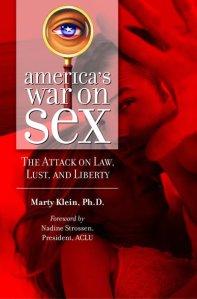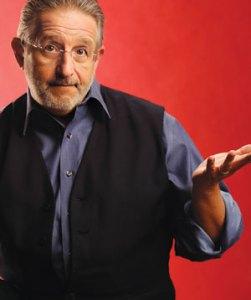The…expression “culture war”…suggests two sides of equal strength…wanting to conquer each other. But what we commonly call the “culture war” is not like this at all. Those who hate and fear sexuality (erotophobes) are attacking those who appreciate or tolerate sexuality (erotophiles). And while erotophiles are not attempting to force erotophobes to live more sexually adventurous lives, erotophobes insist that both sides – everyone – live according to their erotophobic values. - Marty Klein
 That’s a slightly-abridged version of the first few sentences of America’s War on Sex, Dr. Marty Klein’s analysis of the ongoing campaign to repress any and all consensual sexual activity that does not conform to the most prudish and narrow standards of the most prudish and narrow-minded Americans. In fifteen chapters (alternating short and long, with the long ones divided into subsections) he closely examines the way that organized prohibitionists have colluded with a repressive government to wage a scorched-earth campaign on sex education, reproductive rights, porn, “indecency” on television, adult businesses (including strip clubs), the internet and sexual minorities (including gays, polyamorists and BDSM aficionados). Klein is an engaging writer and doesn’t pull his punches; his highly-readable style is reminiscent of good glossy-magazine journalism, complete with insert boxes and bullet-pointed facts. He tears apart all the major prohibitionist arguments and provides statistics to refute claims about “premature sexualization”, “negative secondary effects”, supposed harm caused by porn, and other myths used by the prohibitionists to pretend their anti-sex crusade is based in something other than pure dogma.
That’s a slightly-abridged version of the first few sentences of America’s War on Sex, Dr. Marty Klein’s analysis of the ongoing campaign to repress any and all consensual sexual activity that does not conform to the most prudish and narrow standards of the most prudish and narrow-minded Americans. In fifteen chapters (alternating short and long, with the long ones divided into subsections) he closely examines the way that organized prohibitionists have colluded with a repressive government to wage a scorched-earth campaign on sex education, reproductive rights, porn, “indecency” on television, adult businesses (including strip clubs), the internet and sexual minorities (including gays, polyamorists and BDSM aficionados). Klein is an engaging writer and doesn’t pull his punches; his highly-readable style is reminiscent of good glossy-magazine journalism, complete with insert boxes and bullet-pointed facts. He tears apart all the major prohibitionist arguments and provides statistics to refute claims about “premature sexualization”, “negative secondary effects”, supposed harm caused by porn, and other myths used by the prohibitionists to pretend their anti-sex crusade is based in something other than pure dogma.
In fact, his arguments are so well-made that the book’s two major deficiencies are thrown into even sharper relief, and thus become far more annoying than they would be in a weaker text. Some of you may have noticed one of them already, but if you haven’t take a look back at the list of chapter topics in the previous paragraph. That’s right; prostitution is completely absent. Though Klein mentions it in passing two or three times, it’s always in conjunction with something else and is never elaborated upon; there isn’t even an index entry for “sex work”, “prostitution” or any other synonym. And though he discusses police campaigns against swinger’s clubs, he can’t spare a few paragraphs for the organized persecution of whores which is the longest continuously-active front in America’s war on sex (going on 100 years now). While Klein dares to say that porn is a healthy expression of sexuality, he doesn’t even suggest that buying or selling sex in a more direct way is not pathological; though he vigorously attacks the bogus statistics prohibitionists use to attack other forms of sex work, he makes no such effort against bogus claims about hookers; and while he does not hesitate to point out the myths and exaggerations by which prohibitionists disguise their bigotry against other sexual minorities, he is utterly silent about the “sex trafficking” hysteria (which was already two years old and rapidly growing when the book was published in 2006).
 The other problem is in a way worse, because it represents a dangerous distortion rather than a simple omission. And while it could be argued (however unconvincingly) that Klein left whores out for fear of alienating his target audience, there is no excuse for his willful mischaracterization of the identity of the enemy; it’s as though an author writing about World War II blamed the whole thing on the Nazis and acted as though the Japanese didn’t exist. Though Klein doesn’t spare any ammo in attacking one end of the Anti-sex Axis, conservative Christianity, he doesn’t even bother to aim at the other end: neofeminism. Though James Dobson, Jerry Falwell and their ilk are quoted extensively and debunked thoroughly, there is no mention of Andrea Dworkin, Catharine MacKinnon, Gail Dines, Melissa Farley or any of the others who have caused at least as much damage to sexual freedom as their Christian allies. Indeed, the neofeminists are arguably much more dangerous because they appeal to a much wider demographic; consider that while the Christian prohibitionists have adopted a great deal of neofeminist rhetoric, the opposite is not true.
The other problem is in a way worse, because it represents a dangerous distortion rather than a simple omission. And while it could be argued (however unconvincingly) that Klein left whores out for fear of alienating his target audience, there is no excuse for his willful mischaracterization of the identity of the enemy; it’s as though an author writing about World War II blamed the whole thing on the Nazis and acted as though the Japanese didn’t exist. Though Klein doesn’t spare any ammo in attacking one end of the Anti-sex Axis, conservative Christianity, he doesn’t even bother to aim at the other end: neofeminism. Though James Dobson, Jerry Falwell and their ilk are quoted extensively and debunked thoroughly, there is no mention of Andrea Dworkin, Catharine MacKinnon, Gail Dines, Melissa Farley or any of the others who have caused at least as much damage to sexual freedom as their Christian allies. Indeed, the neofeminists are arguably much more dangerous because they appeal to a much wider demographic; consider that while the Christian prohibitionists have adopted a great deal of neofeminist rhetoric, the opposite is not true.
I do not believe that Klein engaged in deliberate obfuscation in either of these cases; given the honesty and devotion to individual liberty (including support for sex worker rights) he displays on his own website, Sexual Intelligence, I rather suspect his publisher may have had something to do with the missing subject matter. If his editor had neofeminist leanings it might’ve been impossible to get pro-sex worker text or criticism of feminist catechism past her; on the other hand, we don’t know that he even tried. These twin flaws aren’t fatal, but they are most assuredly crippling; the book is still worth a read, but it isn’t nearly as good as it could have been, or as I had hoped it would be.
